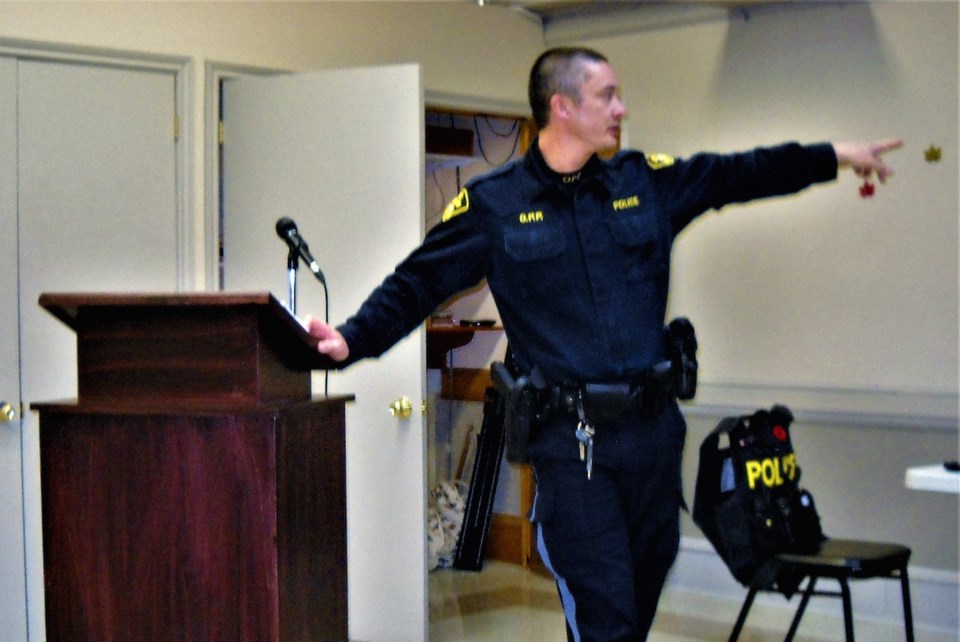A small group of seniors got the latest information about online fraudsters from OPP Constable Phil Young of the Elliot Lake detachment and Constable Bev Gauthier of the OPP in Blind River. The two provided the group with information on household safety and break-in prevention during a presentation Tuesday at the Renaissance Centre for Crime Prevention Week which runs this week through Sunday.
Constable Young told the group that there are new internet frauds and scams every day. He showed a video called The Face of Fraud which dramatized the pervasive CRA scams which have victimized many seniors and other Canadians. Police estimate that fewer than 5 per cent of CRA-based frauds perpetrated on seniors are reported because the victims are too embarrassed about what happened. He said it works like this: Victims are told they need to come up with a sum of money immediately via a purchase of iTune cards which can then easily be cashed online. Once the perpetrator gets access to the serial numbers on the cards, the money can be transferred by the thieves. Police remind us that the Canada Revenue Avency (CRA) does not contact people by telephone demanding tax payments or threatening penalties if they're not made.
What happens on the telephone is that victims are threatened with arrest, and loss of their credit and banking privileges and their passports, unless immediate payment is made of money allegedly owed for unpaid taxes. Constable Young explained that through a process known as "spoofing,” culprits are able to locate the victim's phone number and supply a local or regional Canadian phone number to call back. That's the process through which the victim is linked to an offshore call centre where the scam is being managed. Many of the CRA scams have been based in India.
Some 400 Canadian seniors fall victim to online fraud each month. Constable Young told the seniors that the trick is to recognize fraud, report it, and stop it. He cited the case of a grandfather who told police he got an email supposedly from his granddaughter claiming she needed $1,500 because she was stranded while travelling overseas. Officer Young said the older man responded by wiring the money right away without making any inquiries. The grandfather soon regretted his decision when he didn't get another email from his granddaughter the next day. Other family members later explained to him that the young woman was actually at home and going to school, not travelling or in desperate need of funds. The money he sent never went to her.
Constable Young said we need to be aware that everything we do online leaves a mark. A "digital dossier" or "digital footprint" is the information we leave behind from our interactions in a digital environment. Digital details about us can be gleaned by the "bad guys" through our use of smart phones, GPS, USB thumb drives, MP3 players, digital cameras, gaming systems and, of course, computers. Referring to police, Constable Young said, "It's a huge problem for us."
He also said online social media like Facebook and Twitter can be mined for personal information and search engines like Google also collect vast amounts of personal information from any number of profiles gleaned from everything from obituaries to chat rooms and dating sites. It's all available online. He recommended that we search our own names online to see some of the information anyone with access to the internet can retrieve about us.
Constable Bev Gauthier explained that year-to-date figures show there have been 119 break-ins in Blind River, compared with 56 in Elliot Lake and 36 in Thessalon, so far in 2018. To reduce those figures, she cautioned that people need to make their homes look occupied when no one is home, make sure their neighbours have a good view of their residences and to make it as difficult as possible for thieves to break in. She said many break-ins are drug related since addicts hand over what they steal from break and entries to drug dealers as payment. Constable Gauthier also talked about Safeguard Ontario, an OPP initiated onsite home inspection program designed to achieve home safety goals. It is conducted by police to help homeowners and tenants make their homes safer and less attractive as a target for criminals. More information is available from the OPP.
East Algoma OPP Detachment commander Inspector Tyler Sturgeon told ElliotLakeToday, "We are proud that Ontario communities are among the safest in the world. But community safety and well-being take hard work and collaboration. That's why our service is proud to partner with government and community leaders, young people and businesses to prevent crime in our communities."
